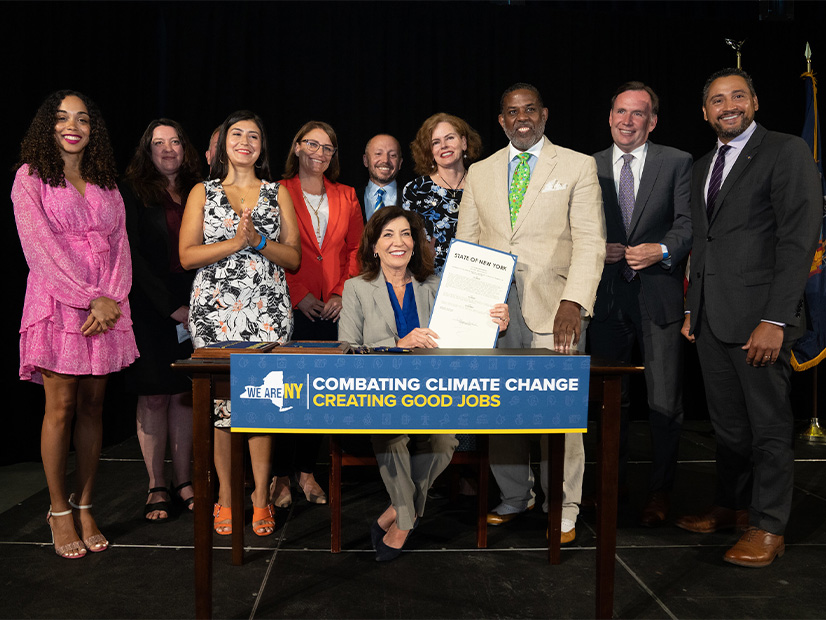
New York Gov. Kathy Hochul signed a climate-related legislative package Tuesday that includes bills to align building codes with state climate law and authorize utilities to operate thermal energy networks.
The Advanced Building Codes, Appliance and Equipment Efficiency Standards Act (A10439/S9405) will update New York’s codes to help reduce greenhouse gas emissions in the building sector, which is the state’s largest contributor to emissions.
“We are going to save $15 billion, which includes $6 billion for low- and moderate-income households at a time when that is so critically important for them,” Hochul said at the bill signing ceremony in Brooklyn. “Stronger energy codes also will give us $2.5 billion in lifetime savings for homeowners.”
The act establishes a new definition of life-cycle cost for regulators to consider when making any potential amendments to the state’s energy conservation construction code. That definition requires regulators to consider the estimated cost of acquisition, operation, maintenance and construction of an energy system for the life of a building.
In addition, regulators will have to ensure that efficiency standards and regulations do not increase emissions of co-pollutants or burden environmental justice communities.
Meanwhile, the Utility Thermal Energy Network and Jobs Act (A10493/S9422) authorizes New York utilities to own and operate thermal energy networks and sell the energy to consumers. Under the law, the Public Service Commission must initiate a proceeding this fall to support thermal network deployment.
Thermal networks are defined in the legislation as the infrastructure that supports utility-scale projects supplying energy from piped, noncombustible fluids for building heating and cooling. State utilities now have three months to submit proposals to the commission for at least one, and up to five, thermal network pilot projects.
For projects developed under the law, utilities will have to demonstrate that they have signed an organized labor agreement, with job priority given to workers at risk of losing their jobs from the downsizing of the gas transmission and distribution system.
Hochul also signed a bill (A.9598/S.8648) that amends the state labor law to ensure that renewable energy systems workers receive prevailing wages for projects with a capacity of 1 MW or more. The previous wage standard applied to projects of 5 MW or more.
“It is critical that workers in new green industries are paid a fair wage and that workers in the fossil fuel industry are not left behind,” John Murphy, international representative for the United Association of Pipe Trades, said during the signing ceremony. A coordinated effort between union leadership and state legislators ensured that “labor standards are front and center in these climate bills.”
Crypto Bill
A cryptocurrency mining bill (A07389/S06486) that passed the New York legislature in the final hours of its session in early June was “missing” from Hochul’s climate package, according to a statement from the advocacy group Seneca Lake Guardian.
“In the middle of a climate crisis, New York cannot allow fossil fuel plants to reopen as gas-guzzling crypto-mining cancers on communities, accelerating climate change just to make a few rich people even richer,” the group said.
The bill would put a temporary moratorium on cryptocurrency mining operations that use an authentication method called proof-of-work (PoW) to validate blockchain transactions.
On June 30, the New York Department of Environmental Conservation denied an air permit renewal for Greenidge Generation’s PoW crypto-mining operation in Torrey, saying that it is “inconsistent” with the state’s climate law.
The natural gas power plant that supports Greenidge’s operations has transitioned from supplying power to the grid to “primarily” providing behind-the-meter power for the mining facilities, the department said.
Under the cryptocurrency bill, the department would develop a generic environmental impact statement for crypto-mining to help the state understand the effects of the PoW technology on energy use.


